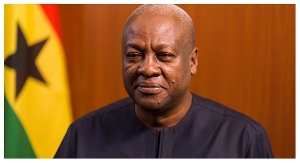 Former President John Dramani Mahama
Former President John Dramani Mahama
In the pursuit of economic prosperity and self-reliance, nations often find themselves at a crossroads, grappling with the challenges of globalization while striving to nurture domestic industries and entrepreneurship.
For Ghana, a nation with immense potential yet facing the realities of an import-driven economy, the implementation of visionary policies is paramount to unlocking sustainable growth and development. Chief among these policies is the 24-hour economy initiative, spearheaded by former President John Dramani Mahama (JDM), which holds the promise of catalyzing a paradigm shift in Ghana's economic landscape.
At the heart of the 24-hour economy policy lies a fundamental recognition of the inherent potential within Ghana's workforce and resources. By extending operating hours across various sectors, from manufacturing to services, the initiative aims to maximize productivity, optimize resource utilization, and stimulate round-the-clock economic activity. This bold approach not only aligns with the evolving needs of modern society but also positions Ghana as a dynamic player in the global marketplace.
One of the primary benefits of the 24-hour economy policy is its potential to reduce the nation's reliance on imports and bolster domestic production. As the government strategically impedes the importation of certain products, it creates a compelling incentive for local producers and entrepreneurs to fill the gap.
This shift in consumer preferences towards locally made goods not only strengthens the domestic market but also has a ripple effect on the nation's currency, as reduced imports contribute to a more favorable balance of trade.
The novel 24-hour economy policy serves as a catalyst for diversification and innovation within Ghana's economy. As businesses adapt to extended operating hours, entrepreneurs are incentivized to explore new sectors and investment opportunities. This not only spurs job creation and economic growth but also fosters a culture of entrepreneurship and resilience within the Ghanaian workforce.
The benefits of this policy are enormous, the 24-hour economic policy can synergize with the goals of the African Continental Free Trade Area (AfCFTA) by enhancing trade opportunities across different time zones, fostering intra-African trade, and facilitating seamless transactions. This policy can bolster connectivity and communication channels, particularly benefiting small and medium enterprises (SMEs) by expanding their market reach and competitiveness within the AfCFTA framework.
In essence, it can stimulate job creation across various sectors, contributing to economic growth and poverty reduction. Additionally, the proposed policy by former president H.E. John Mahama will necessitate infrastructure development, such as transportation and digital connectivity improvements, which can further enhance trade efficiency under the AfCFTA, ultimately promoting economic development and prosperity across the African continent.
Moreover, the policy has the potential to drive value addition and processing within the economy, thereby enhancing Ghana's competitiveness in the global arena. By investing in the production of raw materials and expanding processing capabilities, the nation can capture more value along the supply chain, create higher-skilled jobs, and position itself as a hub for value-added exports.
In conclusion, the 24-hour economy policy represents a transformative opportunity for Ghana to chart a path towards sustainable economic development and self-reliance. By harnessing the power of extended operating hours, increasing local production, and nurturing entrepreneurship, Ghana can position itself as a beacon of prosperity and progress in the African continent.
As we embrace this bold vision for the future, let us rally behind the leadership of John Dramani Mahama and collectively work towards building a brighter, more prosperous Ghana for generations to come.